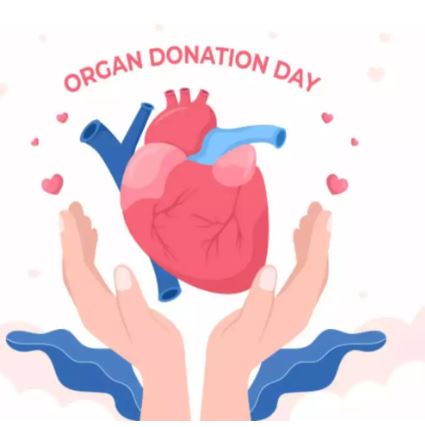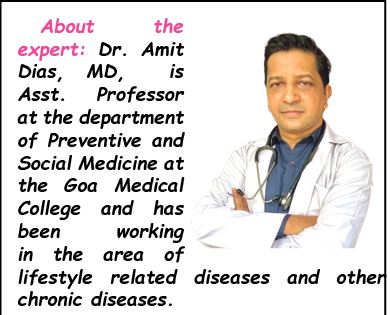Goa is abuzz with excitement as vintage bike and car owners, users, collectors and fans are decking […]

Donate Organs: Live Beyond Your Life!
Aug 12- Aug 18 2023 August 11, 2023A World Organ Donation Day Special
August 13 is Organ Donation Day. The Goan Observer catches up with DR AMIT DIAS to get a deeper understanding of organ donation. “There cannot be a more noble service to humanity than to donate your organs to save lives,” says Dr Dias, as he addresses the myths surrounding organ donation and explains how we can pledge to donate our organs….
Goan Observer: Doctor, why do we observe Organ Donation Day?
Dr Amit Dias: We observe World Organ Donation Day to encourage people to become organ donors as there is a huge shortage. It is estimated that every year, five lakh people in India, die due to the non-availability of organ donation. Around 1.5 lakh people await kidney transplants and just around 5,000 get it. 15 people die every day waiting for an organ donation and every 10 minutes a new name is added to the waiting list. Organ shortage is often due to the lack of knowledge and myths and misconceptions that surround it. Sensitive reporters need to highlight the need and encourage organ donation through media. The theme for organ donation day this year is simple and self-explanatory – “Donate Organs & Save Lives.”
QUESTIOIN: How many lives can one save by taking the organ donation pledge?
ANSWER: One person can save more than 8 lives and enhance the lives of several others, by donating their organs. With the rapidly advancing technology in medicine, many more organs and tissues can be transplanted. Kidneys, heart, lung, liver, pancreas, cornea, small intestine, skin, bone, heart valves, veins and now even hands can be transplanted. When you pledge your organs, you will get a choice to select which organs you would like to donate in form 7.
Q: Organ donation can be from living as well as dead people right?
A: Yes, there are two broad types of organ donation
- Living Donor Organ Donation: A person while living can donate one kidney (the other kidney can maintain the function), part of the pancreas (half pancreas can maintain the function), and part of the liver (the liver can regenerate).
- Deceased Donor Organ Donation (after brain death): a person can donate multiple organs and tissues after brain death. His organs will continue to function in the other person’s body.
Q: Could you clarify what is the difference between an organ and tissue?
A: An organ is part of the body that has a specific function such as the kidney, heart, lung, intestine, pancreas or liver … whereas tissue refers to a group of cells performing a certain function, for example, bone, heart valve, skin, tendon cornea. All can be transplanted.
Q: You mentioned about the myths and misconceptions surrounding organ donation, can you burst some of them?
A: There are several myths surrounding organ donation which hinder the process. This was also the finding in our study that was recently published in the International Journal of Scientific Study. 10% of the people in our study felt that one could buy and sell organs and this is completely false. Some feared they may be purposely declared brain dead to retrieve their organs — which is also completely false.
We often hear people say:
“Organ donation will disfigure my body after I die.” : This is not true. Donation will not change the way the body looks. The surgery is done very carefully.
“I am ineligible to be a donor as I have co-morbidities.”: This is not true…. people with diabetes, heart disease, cancer, and other diseases can also donate their organs and save lives.
“I am too old to donate my organs” : This is not true, age is not the criteria, and the clinician will carefully examine and decide the eligibility.
“The families of the doner are charged for the donation.”: This is not true — there is no charge to the family.
“Organ and tissue donations are against my religion.”: This is not true, all major religions support organ donation.
“The rich are more likely to get the organ transplant quickly”: This is not true. There is a strict criteria followed about who will receive the organ and the bank balance and celebrity status is not part of it.

Q: Who is eligible to be a donor?
A: For a living donor — anyone who is 18 and above, who voluntarily authorizes the removal of any of his tissues can donate as per guidelines.
For a deceased donor, the cut-off of 18 years does not matter. Anyone, of any age, gender and race can be considered for organ donation. This can only be done after the person is declared brain dead after following a strict procedure and they have the consent of the next of kin in lawful possession of the dead body. Depending on the physical state of the individual the organs can be harvested for transplant. There is a range, kidney and liver can be up to 70 years whereas cornea and skin can even be taken from someone who is 100 years old!
Q: What is your message to readers?
A: Let me keep the message simple. Donating organs is donating life and you can live beyond your life by making this gift. All you need to do is fill up Form 7 available at this link: https://forms.gle/e52ENLLqSWQxjUXWA
Do inform your next of kin that you have filled out the form. You will become a proud owner of an organ donation card, which will be sent to you by e mail from the State Organ & Tissue Transplant Organisation in Goa.
Do write to the Goan Observer once you pledge your donation and share what you felt while you did it and your story could be published. You are the superhero who saved more than 8 lives by one decision. May you all have a long life!
















